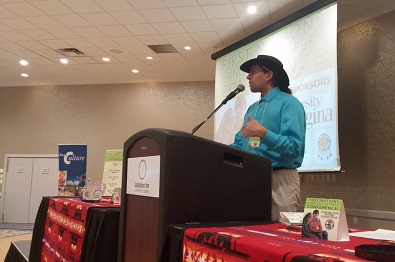Robert Hall speaking at this year’s First Nations Language Keepers Conference in Saskatoon. Photo by Joel Willick.
A linguistics professor from the United States says scientific research can help improve Indigenous language revitalization.
Robert Hall, from the Blackfeet Reservation in Montana, was a keynote speaker at this week’s First Nations Language Keepers Conference in Saskatoon.
During his presentation, Hall spoke on the Accelerated Second Language Acquisition program, which he used to learn his Blackfoot niitsiipo”’sin language.
“Through learning my own language through ASLA I can actually speak (my language) and nothing makes me happier,” he says.
Through the guidance of his mentors Hall is now using the ASLA program to teach his students Indigenous languages.
“When you are teaching in ASLA people are not memorizing, they are internalizing and experiencing,” he says.
The ASLA program was developed from date discovered in various scientific fields like psychology, speech, pathology and neurology. The program then applies that data to learning Indigenous languages.
During his presentation Hall compared language learning to the Aviation industry. He says from the beginning of air travel until the 1990s there was a high rate of pilot error causing plane crashes. Hall says the invention of a better flight simulator for pilots in training has greatly reduced these pilot caused crashes. The linguistics professor says the ASLA program adopts that same form of experiential learning.
“The key is experiential learning,” says Hall. “Just like a pilot simulation will take someone up into the sky, ASLA will take someone into a camp.”
Hall encouraged those in attendance at the conference to adopt the program.
“There is no elevator in learning language, you can go from zero to 100,” he says. “You have to learn every step and ASLA can help you do that.”
Hall Finished his keynote with comments on Standing Rock and the Idle No More movement. He believes language will help Indigenous communities battle colonization.
“The loss of language is a part of colonization,” he says. “Speaking your language is opposing colonization.”
